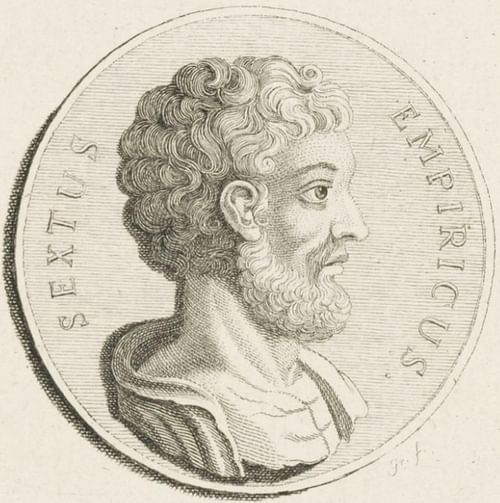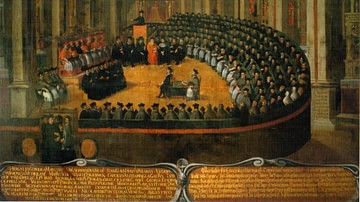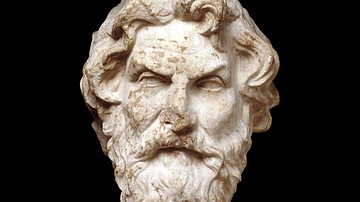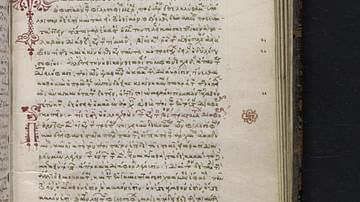
Sextus Empiricus (l. c. 160 to c. 210 CE) was a Greek Skeptic who developed the ideas of the earlier Greek Skeptic philosopher Pyrrho of Elis (l. c. 360 to c. 270 BCE) who claimed that tranquility of mind was attainable by suspending judgment. Empiricus drew on this claim to detail in writing how to implement it fully in one's life.
Nothing is known of Empiricus outside of his works, which give little biographical information. His dates are still debated, and his name is more of a title meaning "Sextus of the Empirical School" referencing his association with the empirical school of medicine (although he seems to have aligned himself more closely with another, the methodist school). According to scholar Thomas Mautner, "his name indicates that he was a physician who based his practice on clinical observation rather than received medical doctrine" (520). This would seem to be so as his works consistently emphasize the importance of personal observation and reflection. He is said to have written ten books on Pyrrhonism of which two survive – Outlines of Pyrrhonism and Against the Mathematicians (commonly given as Against the Professors) – both influential in the modern era.
Empiricus' works were discovered by agents of the Florentine banker and statesman Lorenzo de' Medici (l. 1449-1492) and added to the collection of his library. Translated into Latin in the 16th century, Empiricus' works influenced the French Renaissance philosopher and writer Michel de Montaigne (l. 1533-1592), the French Jesuit apologist and controversialist François Véron (l. c. 1575-1649), and the French writer François de la Mothe le Vayer (l. 1588-1672). Empiricus was then used during the Catholic Counter-Reformation (1545 to c. 1700) to deflate the arguments of the Protestant Reformation (1517-1648).
Empiricus' works continue to be studied in the present day and exert the same power in claiming one cannot come to conclusions on anything because one's interpretation of reality does not correspond to actual reality. According to Empiricus, to live a peaceful life without conflict, one should suspend judgment and even the expectation that one can make sound judgments, but this central point has been ignored more often than not as his works are instead used to attack other ideologies or defend one's own.
Pyrrho & Pyrrhonism
The story of Pyrrho of Elis is largely given by the historian Diogenes Laertius (l. c. 180-240), who is considered unreliable as he never cited his sources and seems to have frequently made stories up. Even so, as some of his observations have been corroborated, he is still used by historians and scholars when no other source is available. According to Laertius, Pyrrho was influenced by the teachings of the atomist Democritus (l. c. 460 to c. 370 BCE) who advocated for a naturalistic, rather than theistic, understanding of the world. Pyrrho was introduced to Democritus' works by his teacher Anaxarchus (l. c. 380 to c. 320 BCE) who was a friend of Alexander the Great (l. 356-323 BCE). Pyrrho and Anaxarchus followed Alexander on his campaign to conquer Persia in 334 BCE, traveling with him to India.
In India, Pyrrho is said to have met with "magi" who, according to Laertius, led him to "adopt a most noble philosophy…taking the form of agnosticism and suspension of judgement" (11.61). Although never identified in Laertius' work, these "magi" were most likely adherents of the philosophical school of Charvaka, which claimed pleasure was the highest good in life and focused on a materialist understanding of the world. Skepticism was an integral aspect of Charvaka in that adherents maintained that any claims one made about anything were based on subjective interpretation of reality, which could not correspond to objective reality simply because one's past experiences and beliefs informed one's interpretation.
As this understanding is quite close to Pyrrho's later philosophy, Charvaka is the most likely influence, although later historians have cited adherents of Hinduism, Jainism, and Buddhism as possible candidates for Laertius' "magi". After returning home to Elis, Pyrrho gave away his possessions and lived a life of simplicity while teaching the philosophical outlook that came to be known as Pyrrhonism.
His teachings were preserved by his student Timon of Philus (l. c. 320 to c. 235 BCE), whose works are now lost but were quoted, in part, by later writers. Among these was Aristocles of Messene (l. c. 1st century) quoted by Eusebius of Caesarea (l. c. 260 to 399 CE) who preserved the so-called Aristocles Passage summing up the precepts of Pyrrhonism. The passage asks three questions:
- What is the nature of any subject matter, including ethics?
- How should one respond to any subject matter, including ethics?
- What will be the outcome of one's response to any subject matter?
The answers are then given:
- All observable phenomena are undifferentiated, unstable, and unfixed by their nature.
- One's sense perceptions cannot tell one the truth about observable phenomena nor can they lie because observable phenomena are beyond the ability of the senses to truly comprehend.
- One should, therefore, refrain from judgments or any conclusions regarding what is perceived, refusing to accept any claims, on the basis that they are neither truth nor a lie but simply a person's observation based on experience and belief.
By suspending judgment and refusing to become involved in a speculative argument over conclusions that are only opinion, one achieves the state of ataraxia, freedom from psychological distress, and maintains one's balance and tranquility in life.
Revival & Sextus Empiricus
Pyrrho's teachings seem to have been codified as a school of thought, but as its central tenet must have been a refusal to hold to anything like a central tenet, it died out only to revive in the 1st century BCE in the works of one Aenesidemus whose Pyrrhonian Discourses attracted the attention of Sextus Empiricus. Empiricus also had before him the works of Antiochus of Ascalon (l. c. 125 to c. 68 BCE) who had harmonized the skepticism of Pyrrhonism with the belief that conclusions could be understood as true by the use of reason. Even if one's subjective interpretation of reality differed from objective reality, reason could correct one's errors and bring one closer to accurate perception and judgment.
Empiricus seems to have written his works to share his observations on the possibility of living a tranquil life and, while he recognized the power of reason and the probability that one could come to accurate conclusions, still maintained that no good could come of engaging in judgments. As soon as one said something like "This is a bad book," someone else could counter with "No, this is a good book," and then one found oneself in controversy and distress over nothing since both claims were simply opinion. One could claim "I feel cold at the moment" because one was expressing one's individual experience and nothing more, but one should refrain from judgments such as "Cold is bad" since one was then making a universal judgment on the nature of cold, and this could be nothing more than one's personal opinion.
In his Outlines of Pyrrhonism, Empiricus notes how "to every argument an equal argument is opposed" (I. XXVII. 202). Each time someone makes a claim such as "God exists," it can invite the response of "God does not exist." To Empiricus, the ensuing argument over God's existence is meaningless because it is simply two sides stating their opinion. There cannot be a resolution because there is finally no way to objectively prove one side or the other, and so such arguments can only lead to conflict and psychological distress. Empiricus encourages one to, instead, adopt the skeptical approach, which he defines in Book I of Outlines of Pyrrhonism:
Skepticism is an ability, or mental attitude, which opposes appearances to judgments in any way whatsoever, with the result that, owing to the equipollence of the objects and reasons thus opposed, we are brought firstly to a state of mental suspense and next to a state of "unperturbedness" or quietude. (IV.8)
As one maintains the skeptic stance, he suggests, others may be inclined to adopt it as well, which would lead to peaceful coexistence as no one would be insisting on 'truths' that could not possibly be objectively proven.
Central Theme & Works
Empiricus discusses this outlook at length in Outlines of Pyrrhonism and develops his points further in the eleven books of Against the Professors:
- Book I: Against the Grammarians
- Book II: Against the Rhetoricians
- Book III: Against the Geometers
- Book IV: Against the Arithmeticians
- Book V: Against the Astrologers
- Book VI: Against the Musicians
- Book VII: Against the Logicians
- Book VIII: Against the Logicians continued
- Book IX: Against the Physicists
- Book X: Against the Physicists continued
- Book XI: Against the Ethicists
The original title of this work, Adversus Mathematicos, translated as Against the Mathematicians, had nothing to do with mathematicians but with those who claimed to be 'learned' in a specific field, which is why the English title is given as Against the Professors. In each book, he argues specifically against making claims (arguments) which invariably have counterclaims (counterarguments). By refusing to make such claims, which one then feels compelled to defend, one removes oneself from conflict, real or potential, and may then live one's life in peace while offering that same possibility to others.

Sextus Empiricus & the Counter-Reformation
When Empiricus' works were discovered and translated in the 16th century, however, the possibility of peace was ignored, and his philosophical skepticism was weaponized by the Catholic Church in its efforts to counter the claims made by the leaders of the Protestant Reformation. The Reformation had been ongoing since 1517 when Martin Luther (l. 1483-1546) first challenged the authority of the Church. Martin Luther's 95 Theses, originally intended as an invitation to debate the practice of selling indulgences, sparked a widespread cultural, social, and religious revolution, which rejected the authority of the Church and claimed that each individual could interpret scripture and apprehend divine truth on their own without an intermediary.
Reformers like Luther, Huldrych Zwingli (l. 1484-1531), and John Calvin (l. 1509-1564) claimed that believers were justified by their faith alone and required only access to the scripture for salvation and a personal relationship with God. The Church rejected this claim on the grounds that individuals did not have the ability to interpret scripture on their own and that, if anyone could claim to know Ultimate Truth then there was no Ultimate Truth, only opinion. Without a central authority to determine truth from untruth, anyone could claim they understood God's will, and there was no way to contest this.
The Church claimed one could be confident of its truths because they had been reached through scholastic and learned study of scripture, through adherence to tradition based on scripture, and through the magisterium (the teachings of the Church hierarchy of the pope and bishops). By contrast, they noted, the Protestants offered nothing by way of truth save their personal claims to salvation and an inerrant ability to interpret the Bible. By introducing Empiricus' skepticism into the arguments, they undermined the Protestant claims by questioning how they could claim to know truth when, as Empiricus demonstrated, one's subjective understanding could not accurately interpret or understand even the simplest aspects of objective reality.
Montaigne had already expressed the skeptical view in his famous phrase, "What do I know?", sincerely asked in trying to separate truth from opinion. This point of view was turned on the Calvinists of France by François Véron in the form of "What do you know?" backed by the work of Empiricus. In his debates with Calvinist clergy, Véron pointed out that scripture does not include any guide for interpretation, and so if one is interpreting it on one's own, one is likely to make mistakes. Without a central authority to determine truth from error, there is no way one can know if one has interpreted a biblical passage correctly. Further, using Empiricus, Véron encouraged the Calvinists to doubt their conclusions by noting they were only making claims that could be countered by other claims and this could never be profitable without a central authority to determine truth. Scholar Richard H. Popkin comments:
Veron intended only to present a skepticism with regard to the uses of sense and reason in religious matters. In terms of this, he tried to show that once the reformers denied there was an infallible judge, they could have no guaranteed faith because they had no defensible rule of faith. Every criterion of religious knowledge they adopted – scripture, inner persuasion, reason – was shown to be doubtful if applied to religious questions. The Calvinists could not obtain religious certainty because any standards they employed could be undermined by Veron's type of skepticism. (3)
Empiricus was used effectively throughout the Catholic Counter-Reformation by introducing and encouraging doubt in the most basic tenets of Protestant faith, namely that one needed faith alone and scripture alone to be saved and to know God. Véron and other Jesuits like him used Empiricus consistently to break down Protestant intellectual arguments and bring people back to the Church, one of the central aims of the Counter-Reformation which, certainly in France, was met.
Conclusion
By the end of the Counter-Reformation c. 1700, Sextus Empiricus had fallen out of favor with Catholic apologists and controversialists since, as Popkin notes, it became clear that the same arguments they had used against the Protestants could be used against them. If, as Empiricus said, any argument could be countered by any other and subjective interpretation could not grasp objective truth, then there was no way Catholics could know if what the pope, bishops, or tradition told them was true any more than what the Protestants had claimed.
Sextus Empiricus had already exerted significant influence on major figures such as Montaigne and René Descartes (l. 1596-1650) and would continue to as evidenced by his effect on John Locke (l. 1632-1704), referred to as the "Father of Empiricism" in the modern era. Empiricus would also inspire the works of the German philosopher Georg Friedrich Hegel (l. 1770-1831), English philosopher John Stuart Mill (l. 1806-1873), and Scottish empiricist David Hume (l. 1711-1776) among many others.
Although his works were used to dismantle the arguments of the Protestants in the 16th and 17th centuries and have since been referenced in arguments for atheism or agnosticism, Empiricus himself never suggests his skepticism as an intellectual weapon but, rather, as a means toward personal tranquility and balance. By refusing to engage in pointless argument, he suggests, one could find better uses for one's time. He seems to have overlooked the obvious fact, however, that human beings somehow derive pleasure from such arguments, and his works have long served to contribute to controversy far more than their intended purpose.







